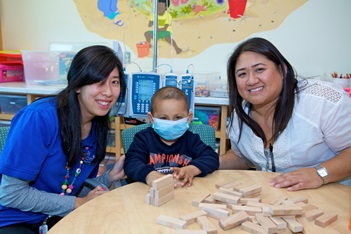Siblings of hospitalized children have a great need for information. Although you may want to protect your children by keeping information from them, what they imagine is happening may be far more frightening than the reality. Some parents underestimate their children’s capacity to understand and a sibling’s desire for information about the ill or injured child.

Information is the key component to supporting your children and helping them cope with hospitalization. Children are better able to adjust when they are given honest and age-appropriate information and the opportunity to see their hospitalized brother or sister. In emergency situations, explain, as soon as possible, how serious the illness or injury is and when they will be able to see their sibling. For planned admissions, involve the patient’s sibling in the preparation, such as packing for the hospital and taking the hospital tour.
Preparing Siblings for the Hospital Visit
Describe and allow children to see the medical equipment being used to care for the patient: How it looks, how it sounds and how it is helping the patient. The child will no longer have to rely on his imagination to make sense of things. A child life specialist will be helpful in preparing siblings for a hospital visit.
Common Sibling Reactions
- Guilt: Often, children feel responsible for the hospitalization. They may think that something they have said or done has caused the illness or injury.
- Fear: Children may worry that the same thing will happen to them. They may be afraid they will “catch” the illness from the patient.
- Jealousy: Children may think it is not fair that the patient is getting so much attention and wish to become sick themselves.
- Anger: Children may be upset and resentful about the changes the that hospitalization has caused in their normal routine.
- Neglect: Children may feel that their parents no longer love or care for them when more time is being spent on the patient.
Helping Siblings Cope
- Be honest.
- Keep communication open. Allow siblings to ask questions. Children sense when information is being kept from them.
- Involve siblings in the hospitalization.
- When children are unable to be at the hospital, they can maintain communication by drawing pictures, writing letters or tape-recording messages.
- Maintain as close to your normal routine as possible.
- Children should be encouraged to go to school and participate in their usual activities as much as possible. It is important for both parents and siblings to spend time together away from the hospital